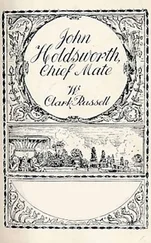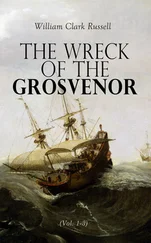“Yes, they belong to ships at anchor like ours.”
“How beautiful is this night! I have left my boy asleep and stolen from the cabin to breathe the fresh air.”
“I daresay the dear little fellow sleeps well after the excitement he has gone through. I noticed that his wondering eyes were very busy when we were in the river.”
Hearing this, she grew frank and cordial at once. Her woman’s heart was as sure of him as if she had known him all his life.
“Did you notice my child? I should have thought you were too much occupied. He was tired out, God bless him! when I put him to bed; too tired even to say his prayers. He has no father now to love him, so I must give him a double share of my love.”
“Ah, you will not find that hard. He is a manly little fellow, and he and I will become great friends, I hope.”
“I trust you will.... You are Mr. Holdsworth? I heard the captain call you by that name. And you are the chief mate?”
“Yes, madam.”
“I admire your profession, Mr. Holdsworth, and have a good excuse for doing so, for both my father and brother were sailors. But I don’t think I could ever let my boy go to sea; I could never bear to part with him. And I sometimes wonder how the wives of sailors can endure to be separated from their husbands.”
“That is the hardest part of our profession,” answered Holdsworth quickly. “I never understood it before this voyage. I have had to leave my young wife; may God protect her until I come back.”
“Is she very young?”
“Nineteen.”
“Poor girl!” exclaimed the widow, with deep sympathy in her voice. She added, cheerfully, “But this separation will only make you dearer to each other. You are sure to meet again. Time flies quickly, and all these weary days will seem no more than a dream to you when you are together.”
She sighed and glanced down at the deep crape on her dress. The moonlight enabled Holdsworth to notice the glance, and the pathos of it silenced him. In the presence of such an experience as her parting was—he knew whom she had lost by her reference to her fatherless boy—his own sorrow appeared light.
“There is always hope, there is always the promise of happiness in store while there is life,” she continued gently. “Do not be down-hearted, Mr. Holdsworth. This parting is but a temporary interruption of your happiness. Be sure that God will protect your young wife while you are away, and do not doubt that He will lead you back to her.” She smiled softly at him, and adding, “I must go to my little one now,” bowed cordially and went away.
He could have blessed her for an assurance which, having no better foundation than a woman’s sympathy, cheered him as no thoughts of his own could have done. “That is a true heart,” he said to himself, and resumed his walk, repeating her words over and over again, and drawing a comfort from them that made his step elastic and his eyes bright.
CHAPTER III. – DOWN CHANNEL.
At six o’clock next morning the sleeping passengers were awakened by cries and trampings which, to some of them at least, were novel disturbers of their slumbers. They might have told the reason of all this noise without going on deck; for those who slept in cots found the deck making an angle with their beds, and the lee port-holes veiled with rushing green water, and all the movables crowded together at any distance from where they had been deposited the night before. And hoarse cries sounded, and the flanking of massive chains, and the strange groaning a ship makes when she heels over to a weight of canvas.
Yes! the “Meteor” was under weigh, with a spanking breeze on the starboard quarter, which she would haul round abeam—her best point of sailing—when she had cleared the South Foreland. If this breeze held, the pilot said, he would be out of the ship and toasting her in rum and water at Plymouth before the sun went down next day.
Some of the passengers came on deck when the ship was off Folkestone, and then they saw as fair a sight as the world has to offer—the great white English cliffs topped with swelling tracts of green, with here and there small bays with spaces of yellow sand between; houses thickly grouped—so it seemed in beholding them from the sea—upon the very margin of the cliff; slate-coloured hills paling far, far away with visionary clouds upon them; and between the ship and the shore many pleasure-boats and other craft, with white or ochre-coloured sails and bright flags, lending spots of red and blue to the perspective of the chalky cliff.
The pilot hugged the wind, rightly apprehensive that it might draw ahead and cripple him for sea room; and the “Meteor” hereabouts was so close to the land that those on board her could see the people walking on shore—man’s majesty illustrated by dots of black upon the beach or the heights. Overhead was a brilliantly blue sky, with small wool-white clouds driving over it; the sea laughed in dimples and shivered the white sunlight far and wide, so that every crest gleamed with a diamond spark of its own; and away on the left, a pale faint cloud floating upon the horizon, was the French coast.
The gay panorama swept by and new scenes opened—stretches of barren coast with ungainly Coastguards’ huts for their sole decoration; spaces of vivid green ruled off with lines of soft brown sand, and low black rocks mirrored in the lake-like surface of the water under the lee; whitewashed villages with wreaths of blue smoke curling from their midst, and broad expanses of trees darkening the lightlier-coloured landscape with delicate shadows. Sturdy vessels, the dray-horses of the Channel, slow, deep laden, and wafting, many of them, the scent of pine and other woods across the water, were overtaken and passed, often amid the laughter of the crew on the “Meteor’s” forecastle, and “chaff,” which even the grave Captain Steel, the “Meteor’s” skipper, condescended to smile at. How picturesque these vessels! Here a Dutch barque painted white, with square-faced men staring over the bulwarks; a red-capped commander in sea boots and vast inexpressibles, and a steersman who sometimes looked at the “Meteor” and sometimes at the sails of his own ship, mixing duty and curiosity in a manner delightful to behold; there a North-country brig with dirty patched sails and black rigging, and a crew with smoked faces and a grinning head at the galley door; sometimes a French smack with as many hands on board as would man a Black Ball Liner, women among them in red petticoats and handkerchiefs around their faces, some gutting fish, some mending nets, some peeling potatoes, and all talking and gesticulating at once, but suspending both their work and their talk to crowd to the smack’s side and stare at the noble English vessel; and sometimes a little open boat at anchor, with a man in her fishing with deep gravity, and paying no more heed to the ship in whose wake his cockle-shell would bob like a cork float, than were he the only tenant of the great glittering surface of water.
But soon the coast sank low in the horizon. The “Meteor” was standing for the deeper water of the Middle Channel, and close hauled, but with all sails set, she had paled old England into a thin blue cloud, and was heading straight for the great Atlantic Ocean.
The night passed; the morning broke; but the “Meteor” was not out of the Channel yet. The pilot grumbled as he cast his groggy eyes aloft and saw the weather-leaches lifting. He would have to go about to fetch Plymouth, unless he had a mind to cross the Atlantic, and this was certainly not his intention.
All the passengers came on deck after breakfast; the ladies brought out their work, the gentlemen lighted cigars, and those who had made a voyage before looked knowing as they cast their eyes about and asked nautical questions of the captain.
Читать дальше












